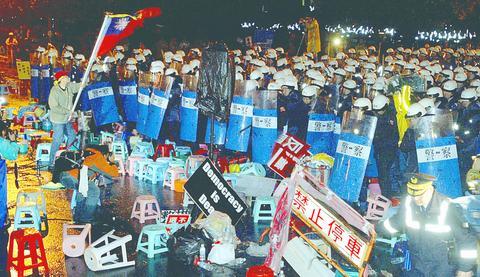The crowd that continued protesting in Ketagalan Boulevard after the end of Saturday's massive rally was finally dispersed by the Taipei Police Bureau at 5:25am yesterday morning.
Taipei Mayor Ma Ying-jeou (馬英九), who ordered the police to act, said the exercise was successful as there had been no violence and nobody was injured in the process.
"I ordered the police to by no means use batons to beat the people who gathered in front of the presidential office building," Ma said.

PHOTO: LIN CHENG-KUNG, TAIPEI TIMES
He stressed that it was he who had ordered the police to disperse the crowd.
"I never balked from dealing with the protesters. I just waited for the most opportune moment to disperse them," Ma said.
Only a few people suffered slight abrasions in the process and many of them left the scene voluntarily, Ma said.
After President Chen Shui-bian (陳水扁) on Saturday night demanded that Ma shoulder his responsibility as mayor of the capital and to disperse the crowd "without using double standards," the Taipei Police Bureau deployed about 800 riot police.
The first deployment began at around 3am yesterday morning. The police, including female officers, squatted or bent down in the rain in front of the crowd in an effort to persuade the people to go home of their own accord.
Many people yelling slogans and singing the national anthem refused to leave and a few skirmished with police.
A second unsuccessful effort was made at about 4am when around 300 people were still lingering in front of the Presidential Office. This was followed by the full contingent of near 800 riot-control police wearing helmets and shields mopping up the remnants of the crowd at 5:25am.
After Bureau Director of Police Wang Cho-chun (王卓鈞) issued the command, the police first tried to persuade the crowd to leave of their own accord. They then carried away, one by one, protesters who refused to leave.
While the police were carrying out orders, the call to remain calm and rational was repeated over a powerful loudspeaker.
At about 7am yesterday morning, Ketagalan Boulevard was completely cleared, with only about 200 people remaining at the Chiang Kai-shek Memorial Hall to continue the protest.
"I can't go on anymore. I have to go home today. I am just too tired," said a woman only identified by her surname, Liao, sitting on the stairs of the National Concert Hall.
She said that she would not adhere to a call by lawmakers of the Chinese Nationalist Party (KMT) to keep up the protest for the next few weeks.
Also See Story:
Row erupts over crowd-clearing

AGING: As of last month, people aged 65 or older accounted for 20.06 percent of the total population and the number of couples who got married fell by 18,685 from 2024 Taiwan has surpassed South Korea as the country least willing to have children, with an annual crude birthrate of 4.62 per 1,000 people, Ministry of the Interior data showed yesterday. The nation was previously ranked the second-lowest country in terms of total fertility rate, or the average number of children a woman has in her lifetime. However, South Korea’s fertility rate began to recover from 2023, with total fertility rate rising from 0.72 and estimated to reach 0.82 to 0.85 by last year, and the crude birthrate projected at 6.7 per 1,000 people. Japan’s crude birthrate was projected to fall below six,

Conflict with Taiwan could leave China with “massive economic disruption, catastrophic military losses, significant social unrest, and devastating sanctions,” a US think tank said in a report released on Monday. The German Marshall Fund released a report titled If China Attacks Taiwan: The Consequences for China of “Minor Conflict” and “Major War” Scenarios. The report details the “massive” economic, military, social and international costs to China in the event of a minor conflict or major war with Taiwan, estimating that the Chinese People’s Liberation Army (PLA) could sustain losses of more than half of its active-duty ground forces, including 100,000 troops. Understanding Chinese

US President Donald Trump in an interview with the New York Times published on Thursday said that “it’s up to” Chinese President Xi Jinping (習近平) what China does on Taiwan, but that he would be “very unhappy” with a change in the “status quo.” “He [Xi] considers it to be a part of China, and that’s up to him what he’s going to be doing, but I’ve expressed to him that I would be very unhappy if he did that, and I don’t think he’ll do that. I hope he doesn’t do that,” Trump said. Trump made the comments in the context

SELF-DEFENSE: Tokyo has accelerated its spending goal and its defense minister said the nation needs to discuss whether it should develop nuclear-powered submarines China is ramping up objections to what it sees as Japan’s desire to acquire nuclear weapons, despite Tokyo’s longstanding renunciation of such arms, deepening another fissure in the two neighbors’ increasingly tense ties. In what appears to be a concerted effort, China’s foreign and defense ministries issued statements on Thursday condemning alleged remilitarism efforts by Tokyo. The remarks came as two of the country’s top think tanks jointly issued a 29-page report framing actions by “right-wing forces” in Japan as posing a “serious threat” to world peace. While that report did not define “right-wing forces,” the Chinese Ministry of Foreign Affairs was